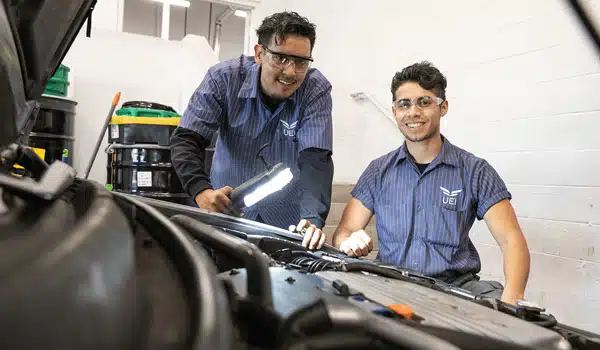What is an Automotive Technician?
| Update: September 05, 2024
Millions of people depend on their vehicles every day to get to and from work, school, or anywhere else. With so many cars on the road and so many people depending on their vehicles to get around, professionals who know how to fix these vehicles are in high demand.
If you love learning how vehicles run and are interested in making that interest into a career, then training as an automotive technician is a smart move. You can prepare for an entry-level career in the automotive field in as few as ten months by enrolling in UEI College’s Automotive Technician Program.
What is an Automotive Technician?
Automotive Technicians are trained professionals who possess the knowledge and skills required to diagnose, fix, and maintain cars.
Automotive technicians have been trained to use specialized equipment to diagnose error codes within a car’s systems. They also have extensive knowledge about how the different systems within automobiles work and the tools and skills necessary to troubleshoot any automobile issues. Also, they have been taught the necessary skills to make these repairs and ensure that vehicles operate correctly without any issues.
Where Do Automotive Technicians Work?
Automotive technicians work in a variety of environments. Auto mechanics work in noisy environments due to the use of power tools. Also, the environments they work in are well-lit so technicians can properly see the parts they are trying to reach. Vehicle repair shops require plenty of tools on hand and equipment to help diagnose issues and lift vehicles up so technicians can reach parts underneath the vehicle.
Most automotive technicians work typical business hours, but some shops offer extended hours to meet the needs of clients, and so it is not uncommon for automotive technicians to work overtime on occasion.
The different places an automotive technician may work include:
1. Repair shops
They may work in an independent or corporate vehicle repair shop. These shops may fix all types of cars or may specialize in one make of vehicle, while others may work on all vehicles that come through the door. Repair shops typically have a small, stable staff that allows customers to build relationships with the people working on their cars.
2. Dealership service center
Automotive Technicians may work at dealership service centers and help customers maintain or repair their automobiles when they come into a dealer service center.
3. Mobile repair company
Some automotive technicians are equipped to make repairs on vehicles at a client’s home or garage. These technicians are typically more experienced as they work independently. Some even run the business themselves or pick up these jobs as a side gig after a full day of work in a shop.
With specialized experience, automotive technicians may also work in automotive body shops, diesel and truck shops, or shops that focus solely on engines, transmissions, or brakes.
Automotive Technician vs Automotive Mechanic
Many times, the titles Automotive Technician and Automotive Mechanic are used interchangeably, but there is actually a difference between the two. An automotive mechanic has the skills to make repairs and replace parts on a vehicle, but an automotive technician has the more technical training that allows them to interpret a vehicle’s error codes, as well as perform the needed repairs. Both have the skills to work on vehicles, but automotive technicians have usually completed a higher level of training.
Should You Become an Auto Technician?
Being an automotive technician is a great career option if you love to work on cars and don’t mind learning new skills. There is a great need for more trained automotive technicians who understand the latest technology and are eager to grow in the field. With the right training and motivation to continue learning, you can build a career that will last for decades. There are so many reasons to consider becoming an automotive technician! Here are a few more:
Valuable knowledge
If you own a car, you should know how to take care of it. If you train to become an automotive technician, you’ll gain valuable knowledge that you can use to care for your own vehicle as well as your family and friends. With experience, you may be able to start your own business.
Quick training
You don’t have to spend years attending college to begin a career as an automotive technician. With training from UEI College, you can prepare for an entry-level position in as few as ten months. Quick training means education is also more affordable than attending a four-year university.
Rewarding work
Car troubles can be extremely stressful, so clients who find a technician who can do the repairs quickly and honestly will continue to come back for years to come. It’s a great feeling to build a trusting relationship with customers and help them get safely back on the road.
Opportunities to grow
There are hundreds of different types of vehicles on the road, and each issue you face as an automotive technician will teach you something new. Newer technology is also introducing constant, new challenges to the industry. If you love solving puzzles and take pride in your ability to learn on the fly, you will never get bored as an automotive technician.
Train To Become An Automotive Technician at UEI College
The automotive technician program at UEI College can get you on the road to a great career quickly. In as few as ten months, you can gain the skills and experience to prepare for an entry-level position.
With a flexible class schedule, supportive and experienced instructors, and classes starting each month, there is no reason to put off training for a new career. We invite you to come to take a tour of our campus and explore if being an automotive technician could be a good fit for you.
Enroll in UEI College's Auto Mechanic Program.





